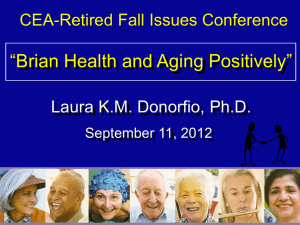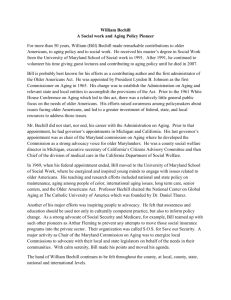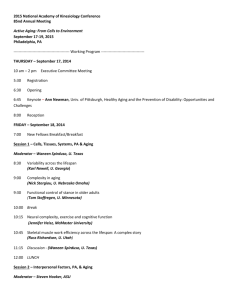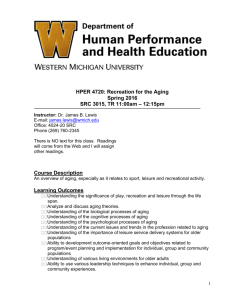B&B 0030 syllabus - University of Pittsburgh
advertisement
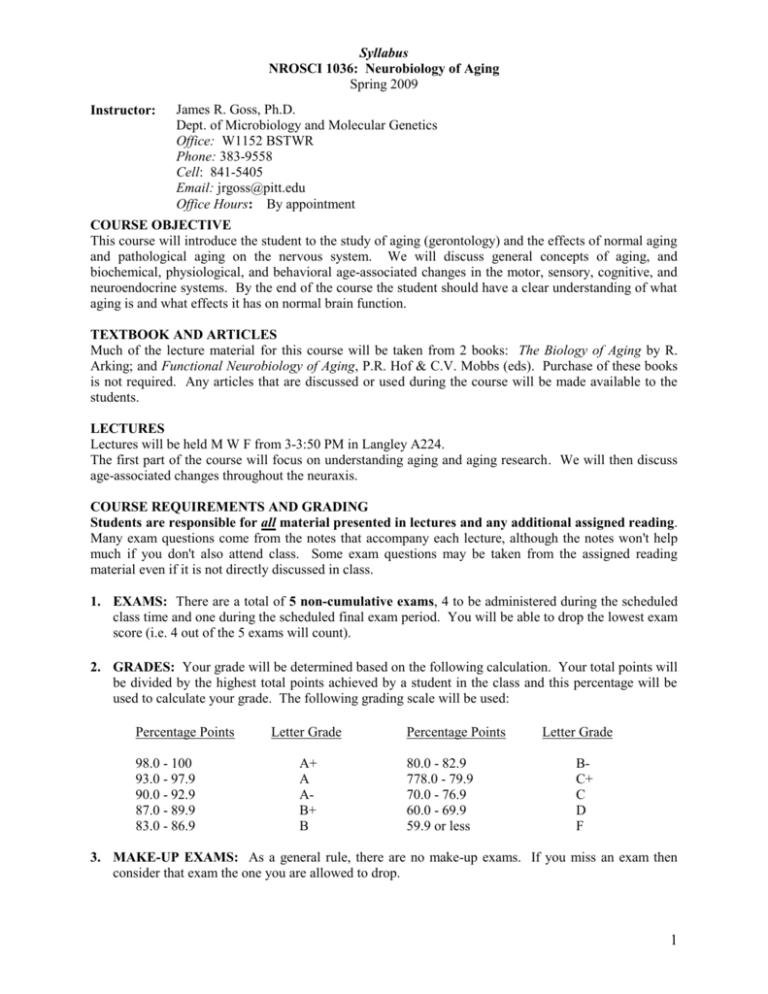
Syllabus NROSCI 1036: Neurobiology of Aging Spring 2009 Instructor: James R. Goss, Ph.D. Dept. of Microbiology and Molecular Genetics Office: W1152 BSTWR Phone: 383-9558 Cell: 841-5405 Email: jrgoss@pitt.edu Office Hours: By appointment COURSE OBJECTIVE This course will introduce the student to the study of aging (gerontology) and the effects of normal aging and pathological aging on the nervous system. We will discuss general concepts of aging, and biochemical, physiological, and behavioral age-associated changes in the motor, sensory, cognitive, and neuroendocrine systems. By the end of the course the student should have a clear understanding of what aging is and what effects it has on normal brain function. TEXTBOOK AND ARTICLES Much of the lecture material for this course will be taken from 2 books: The Biology of Aging by R. Arking; and Functional Neurobiology of Aging, P.R. Hof & C.V. Mobbs (eds). Purchase of these books is not required. Any articles that are discussed or used during the course will be made available to the students. LECTURES Lectures will be held M W F from 3-3:50 PM in Langley A224. The first part of the course will focus on understanding aging and aging research. We will then discuss age-associated changes throughout the neuraxis. COURSE REQUIREMENTS AND GRADING Students are responsible for all material presented in lectures and any additional assigned reading. Many exam questions come from the notes that accompany each lecture, although the notes won't help much if you don't also attend class. Some exam questions may be taken from the assigned reading material even if it is not directly discussed in class. 1. EXAMS: There are a total of 5 non-cumulative exams, 4 to be administered during the scheduled class time and one during the scheduled final exam period. You will be able to drop the lowest exam score (i.e. 4 out of the 5 exams will count). 2. GRADES: Your grade will be determined based on the following calculation. Your total points will be divided by the highest total points achieved by a student in the class and this percentage will be used to calculate your grade. The following grading scale will be used: Percentage Points 98.0 - 100 93.0 - 97.9 90.0 - 92.9 87.0 - 89.9 83.0 - 86.9 Letter Grade A+ A AB+ B Percentage Points 80.0 - 82.9 778.0 - 79.9 70.0 - 76.9 60.0 - 69.9 59.9 or less Letter Grade BC+ C D F 3. MAKE-UP EXAMS: As a general rule, there are no make-up exams. If you miss an exam then consider that exam the one you are allowed to drop. 1 4. GRADING REVIEW POLICY: If you feel that a question or questions were graded erroneously on an exam then you will have the right to make your point. You must submit to me in writing a summary detailing what question(s) you think was graded incorrectly and arguments as to why you believe your answer was correct. This must be submitted to me no later than 1 week after the exam in question has been reviewed in class. I will return your written arguments to you with my decision whether or not to change your grade. 5. G-GRADES: In the event that a student is prevented from completing the course, a G-Grade can be given by special permission from me. The G-Grade allows two additional terms to complete the course work. 6. ACADEMIC INTEGRITY: Cheating/plagiarism will not be tolerated. Students suspected of violating the University of Pittsburgh Policy on Academic Integrity (http://www.fcas.pitt.edu/academicintegrity.html) will be dismissed from the class with a failing grade (F). 7. DISABILITY RESOURCE SERVICES: If you have a medical or learning condition that makes it difficult for you to take an exam during regular class hours you might be eligible to take your exams through the DRS office (216 William Pitt Union, 412-624-7890). Arrangements must be made through the DRS office two weeks before each exam and I must have the DRS Test Form one week before each exam. LECTURE TOPICS (preliminary) 1. Introduction to the Class/What is Aging? 2. Studying Aging in Populations 3. Studying Aging in Individuals 4. Longevity 5. Altering Aging 6. Theories of Aging 7. Gross Neuroanatomical Changes with Aging/Stroke 8. Changes in Neurotransmitter Systems with Aging. 9. Changes in Cognitive Function with Aging. 10. Alzheimer’s Disease and Other Dementias 11. Changes in Motor Systems with Aging/Parkinson’s Disease 12. Changes in Sensory Systems with Aging PRELIMINARY EXAM SCHEDULE Exam 1 – Monday, January 26 Exam 2 – Friday, February 13 Exam 3 – Wednesday, March 4 Exam 4 – Monday, March 30 Exam 5 – Friday, April 17 We may take the 5th exam on the day of the university’s scheduled final exam day (Wednesday, April 22 at 2:00 pm). 2

